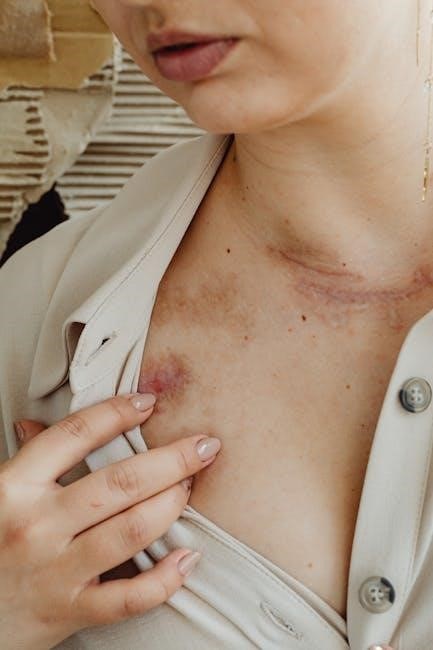Nutrition plays a vital role in wound healing by providing essential nutrients like proteins, vitamins, and minerals that support tissue repair and immune function.
1.1 The Importance of Nutrition in Wound Healing
Nutrition is critical for wound healing as it provides essential nutrients for tissue repair and immune support. Adequate intake of protein, vitamins A and C, zinc, and fluids supports faster healing and reduces infection risk. Malnutrition can delay recovery, making wounds more susceptible to complications. A balanced diet ensures the body has the necessary resources to rebuild tissue, making proper nutrition a cornerstone of effective wound care and overall health restoration.
1.2 Overview of Key Nutrients for Healing
Essential nutrients for wound healing include protein, vitamins A and C, zinc, and iron. Protein aids in tissue repair, while vitamin C supports collagen synthesis. Vitamin A enhances immune response, and zinc facilitates tissue regeneration. Carbohydrates provide energy for recovery, and adequate hydration is crucial for skin health. These nutrients work synergistically to promote healing, reduce infection risk, and support overall recovery. A well-balanced diet ensures optimal intake of these vital components.

Role of Macronutrients in Wound Healing
Macronutrients like protein, carbohydrates, and fats are essential for wound healing, providing energy, building tissue, and supporting the inflammatory response to promote recovery and repair.
2.1 Protein: The Building Block for Tissue Repair
Protein is essential for wound healing, serving as the foundation for tissue repair and muscle strength. It aids in collagen synthesis, immune function, and enzyme production. During healing, protein requirements increase, with recommendations of 1.2-1.5 grams per kilogram of body weight daily. Sources like lean meats, fish, and dairy provide high-quality protein. Inadequate protein intake can delay recovery, making it critical to prioritize protein-rich foods or supplements to support the healing process effectively.
2.2 Carbohydrates and Energy Supply
Carbohydrates are the primary energy source for the body, crucial during wound healing when energy demands increase. They fuel cellular repair and tissue regeneration. Insufficient carbohydrate intake can lead to fatigue and slower healing, as the body may divert protein for energy. Complex carbs, such as whole grains, fruits, and vegetables, provide sustained energy and essential nutrients, supporting the healing process effectively while maintaining overall health.
2.3 Fats and Their Role in Inflammation
Fats are essential for wound healing, particularly in managing inflammation. They provide energy and support the absorption of fat-soluble vitamins like A, D, E, and K, which are vital for tissue repair. Omega-3 fatty acids, found in fish and flaxseeds, reduce inflammation, while omega-6 fatty acids promote it. Balancing these fats is crucial as excessive omega-6 can exacerbate inflammation, potentially slowing recovery. Healthy fats, such as those in avocados and nuts, aid in creating a conducive environment for healing and overall immune function.
Micronutrients Essential for Healing
Micronutrients like vitamin C, zinc, and vitamin A are vital for wound healing, supporting collagen synthesis, immune function, and tissue repair processes.
3.1 Vitamin C: Collagen Synthesis and Immune Support
Vitamin C is crucial for collagen synthesis, strengthening connective tissue and promoting wound closure. It also supports immune function, reducing infection risk and enhancing recovery. Adequate intake accelerates healing by improving tissue repair mechanisms and ensuring proper cell growth. Foods rich in vitamin C, such as citrus fruits and leafy greens, are essential for optimal wound healing outcomes.
3.2 Zinc: A Critical Mineral for Tissue Repair
Zinc is essential for tissue repair, immune function, and cell division. It supports protein synthesis and acts as an antioxidant, reducing oxidative stress during healing. Zinc deficiency can delay wound healing, while adequate intake promotes faster recovery. Food sources include meat, shellfish, and fortified cereals. Supplementation may be necessary in cases of deficiency or increased demand, ensuring optimal healing outcomes by supporting enzymatic functions and maintaining skin integrity.
3.3 Vitamin A: Enhancing the Inflammatory Response
Vitamin A is crucial for enhancing the inflammatory response, a key phase in wound healing. It supports immune function, promotes cell regeneration, and aids in epithelialization. Food sources include liver, carrots, and sweet potatoes. Deficiency can impair wound healing, while adequate intake ensures proper tissue repair and infection resistance. Vitamin A’s role in maintaining skin integrity and supporting the body’s natural defense mechanisms makes it a vital nutrient for optimal healing outcomes.

The Phases of Wound Healing and Nutritional Needs
Wound healing progresses through inflammatory, proliferative, and remodeling phases, each requiring specific nutrients to support immune response, tissue growth, and collagen strength for optimal recovery.
4.1 Inflammatory Phase: Nutrients for Defense
The inflammatory phase initiates wound healing by activating immune responses and preparing tissue for repair. Key nutrients like vitamin A, vitamin C, and zinc are essential during this stage. Vitamin A enhances cytokine release, promoting immune defense. Vitamin C supports collagen synthesis and protects against oxidative stress. Zinc facilitates immune cell function and wound repair. Adequate intake of these nutrients ensures a strong foundation for the subsequent healing phases, helping to combat infection and prepare the wound for tissue regeneration.
4.2 Proliferative Phase: Nutrients for Growth
The proliferative phase focuses on tissue growth and granulation, requiring nutrients that support cell proliferation and collagen synthesis. Protein is crucial for building new tissue structures, while arginine and glutamine support immune function and cell repair. Vitamin C and zinc continue to play vital roles in collagen production and enzyme activity. Additionally, adequate calories and carbohydrates provide the energy needed for rapid cell division and growth during this phase, ensuring the wound progresses toward closure and strength.
4.3 Remodeling Phase: Nutrients for Strength
The remodeling phase focuses on strengthening the newly formed tissue, with collagen remodeling being a key process. Zinc and vitamin C remain essential for maintaining collagen integrity, while protein continues to support tissue repair. Additionally, vitamin E and antioxidants help protect the new tissue from oxidative stress, promoting long-term strength and durability. Adequate calories and micronutrients ensure the wound gains resilience, reducing the risk of reopening and achieving full recovery.

Fluids and Hydration in Wound Healing
Adequate hydration is crucial for wound healing, as water maintains skin health and supports cellular functions. Electrolytes help regulate fluid balance, enhancing tissue repair efficiency and overall recovery.
5.1 The Role of Water in Skin Health
Water is essential for maintaining skin health and promoting wound healing. It keeps skin hydrated, facilitating cellular functions and nutrient delivery. Proper hydration supports tissue repair, prevents dryness, and enhances elasticity. Even mild dehydration can impair healing, making water intake critical. Adequate fluid consumption ensures optimal skin barrier function and supports the body’s natural repair processes, making it a cornerstone of effective wound care and overall health maintenance.
5.2 Electrolytes and Wound Repair
Electrolytes, such as sodium, potassium, and calcium, are vital for wound repair. They regulate fluid balance, nerve function, and muscle contraction, all crucial for healing. Sodium helps maintain cellular hydration, while potassium supports cell growth and protein synthesis. Calcium is essential for tissue repair and collagen formation. Electrolyte imbalances can slow healing, making it important to replenish them through a balanced diet or supplements. Proper electrolyte levels ensure optimal cellular function, promoting faster and more effective wound recovery.
Nutritional Assessment and Recommendations
Nutritional assessment identifies deficiencies and guides personalized dietary plans, ensuring adequate intake of proteins, vitamins, and minerals essential for optimal wound healing and recovery.
6.1 Identifying Nutritional Deficiencies
Identifying nutritional deficiencies is crucial for effective wound care. Deficiencies in protein, vitamin C, zinc, and iron can significantly delay healing. Healthcare professionals assess dietary intake, lab results, and physical symptoms to detect these deficiencies. For instance, low albumin levels may indicate inadequate protein intake, while slow wound progress could signal vitamin C or zinc deficiencies. Addressing these issues early ensures proper nutrient replenishment, promoting faster and more effective wound recovery.
6.2 Personalized Dietary Plans for Healing
Personalized dietary plans are essential for optimal wound healing, ensuring individuals meet their specific nutritional needs. These plans, tailored by healthcare professionals, consider factors like age, weight, and medical conditions. They emphasize balanced macronutrient distribution, with increased protein, carbohydrates, and healthy fats to support tissue repair. Incorporating foods rich in vitamins A and C, zinc, and iron is crucial. Adequate hydration is also highlighted to maintain skin health and support the healing process. Regular monitoring ensures adjustments for faster recovery and improved outcomes.

The Impact of Malnutrition on Wound Healing
Malnutrition significantly impairs wound healing by delaying tissue repair and increasing infection risk. It weakens the immune system and slows cellular regeneration, hindering recovery.
7.1 Consequences of Inadequate Nutrition
Inadequate nutrition significantly delays wound healing by impairing tissue repair and increasing the risk of infection. It weakens the immune system, slowing cellular regeneration and collagen synthesis. Malnutrition can lead to prolonged recovery times, increased hospital stays, and higher healthcare costs. Additionally, it may result in poor wound strength and a higher likelihood of complications, such as wound breakdown or failure to heal. Proper nutritional intake is essential to prevent these adverse outcomes and ensure optimal recovery.
7.2 Strategies to Address Malnutrition
Addressing malnutrition involves personalized dietary plans, ensuring adequate intake of calories, proteins, vitamins, and minerals. Supplements, such as zinc and vitamin C, can be recommended if dietary needs aren’t met. Regular nutritional assessments and consultations with dietitians are crucial to tailor interventions. Additionally, educating patients on balanced eating and the importance of hydration supports recovery. These strategies aim to optimize nutritional status, enhancing wound healing outcomes and reducing complications.
Nutrition is critical for wound healing, with key nutrients like protein, vitamins, and minerals accelerating recovery. Future research should explore personalized diets and advanced nutritional therapies.
8.1 Summary of Key Nutritional Factors
Proper nutrition is essential for effective wound healing, with protein, vitamins C and A, zinc, and hydration playing pivotal roles. Protein aids tissue repair, while vitamins support collagen synthesis and immune function. Zinc is crucial for enzyme activity and tissue regeneration. Adequate hydration maintains skin health, and carbohydrates provide energy for recovery. Fats, particularly omega-3 fatty acids, reduce inflammation. A balanced diet ensures optimal healing outcomes, emphasizing whole foods and supplements when necessary.
8.2 Advances in Nutritional Research for Wound Healing
Recent research highlights the role of specific nutrients like arginine, glutamine, and omega-3 fatty acids in enhancing wound healing. Antioxidant-rich diets and nutritional supplements are being explored for their potential to reduce oxidative stress. Advances in hydrogel technology deliver targeted nutrients directly to wound sites, improving recovery rates. These innovations underscore the evolving understanding of nutrition’s role in wound care, offering promising strategies for faster, more effective healing outcomes in diverse patient populations.

No Responses